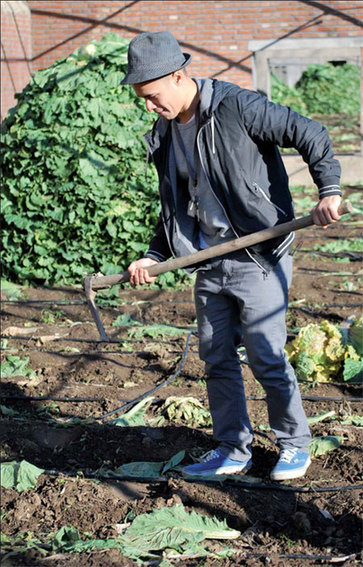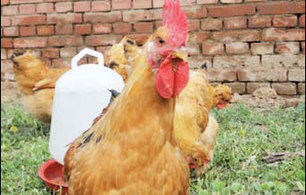Party animal puts down his roots
Updated: 2012-04-27 13:44
By Zhang Lei (China Daily)
|
|||||||||||
Few other things get Chino Martinez more animated than his chickens and organic farming
 |
|
Much of Chino Martinez's time is devoted to his organic farm on the outskirts of Beijing. Photos Provided to China Daily |
In a restaurant near the Russian embassy in Beijing, Chino Martinez, basking in the glow of early spring, enthuses about life down on the farm. For Martinez, 27, skipping from chitchat to the earnest business of business is effortless as he reminisces on how he got into organic agriculture more than three years ago. Yet there is nothing in this Puerto Rican's urbane appearance to suggest that this is a man of the land.
Martinez, whose father was Chinese, says he partied for much of his first six years in Beijing, and, crowned with a fedora and shod with stylish Vans shoes, became almost a fixture in Beijing nightspots.
But all that partying ground to a halt three and half years ago when he rented an abandoned farm on the outskirts of Beijing, with his partner Huang Zhongde. Their ultimate goal: to turn it into an organic farm.
"The farm we rented is expensive, considering how much we can get it for now. In the first year we didn't really know about pricing and stuff like that. We paid 60,000 yuan ($9,500, 7,250 euros) for one year. It is funny you don't really need a big farm to produce a lot of stuff. The key is to use every square centimeter efficiently, not wasting space, time and money."
They spent the first two years getting the farm ready to erect greenhouses, and spent a lot of money making it suitable for their purpose. In the third year it became clearer to them exactly how they would achieve this.
Martinez grabs a piece of paper and begins to scribble diagrams to show how their plant cultivation philosophy works. Soft soil and beds that are off the ground are better for the roots, and promote air circulation, he says. "Our yields are four times the size of traditional farming. We favor the square-foot method. One tomato plant uses 4 square feet (about 3,700 square centimeters). We put one tomato plant in the middle and fill out all the other areas with carrots and lettuce, which do not need a lot of sun."
Plants are grown in the greenhouses, each 60 meters long and 7 meters wide. Separating them are seven aisles, usually 9 meters wide, designed to let in as much sunlight as possible. Huang says most traditional Chinese farmers overlook these shaded areas. Now the pair set aside lanes 2 meters wide for the aisles, using the other 7 meters for grass, protected by wire, to feed the chickens.
"Everything looks messy and leafy, but that's how nature does it. We plant seven kinds of grass here, including alfalfa, trefoil, corn grass and chicory, which meet chickens' basic needs."
The key to making the eggs organic is to ensure that all the chickens eat everything organic. There are also strict standards on the density of chickens in one grass lane.
"The density has to be lower than seven chickens per square meter. They cannot be called free-range if the density is higher, otherwise it is no different to machine-fed chickens - just one big cage instead of a smaller one." Under this formula they can have only 60 chickens in each grass lane.
The entire farm is 10 mu (a little more than half a hectare). Freshly born chickens need to brood in a greenhouse with high-voltage sodium lamps to keep them warm. Meanwhile grass grows in the aisles. When the chickens are 10 centimeters tall they are put in the grass aisles.
 |
| For farm chickens, food is just a stroll away. |
"One grass aisle is always empty for the chickens to move from the previous aisle to the next," Martinez says. "We transfer the chickens every week (to extend the life of the grass)."
Huang says: "Besides the grass, chickens need supplementary forage. We use earthworms, yellow mealworms all grown in our own greenhouses. We mix corn and wheat with them for forage. Basically we produce every part of the egg production cycle. There is no outside buying; if there was we wouldn't be able to control the quality."
Their eggs sell at 2.5 yuan each, about five times the going rate for non-organic eggs. Last winter, they say, they supplied 300 eggs for a banquet in the US embassy for the US-China Forum on Arts and Culture.
"Our eggs are small but heavy," Martinez says. "Our chickens spend 80 percent of their time walking to find their food. The energy formula is all in one. Commercial eggs are produced by chickens locked in a cage that are fed hormones and that get no exercise. They don't move much; they concentrate on laying eggs, which is why those eggs are so big. But what's inside the egg is the most important thing.
"I just came back from Puerto Rico; even there you cannot (get) good eggs; eggs equal commercial profit.
"Some so-called free-range farms feed their chickens in barren, grassless areas, and their chicken practically cannot find any food by themselves. The amount of exercise they take is 80 percent less, and it is no different from caged chickens."
Martinez and Huang have four employees on the farm, one of whom looks after the chickens, feeding them 20 grams of supplementary forage twice a day. Huang says feeding chickens is essential for a farm to be sustainable. They have visited more than 100 farms in China and only 5 percent are organic, they say.
"Our system is a sound, sustainable circle," Huang says.
Huang says some Chinese entrepreneurs have invested millions or even billions to buy the best equipment, but in some cases it is misguided. For example, in Beijing some farms have been equipped with particular types of glass houses that are unsuitable because of the windy climate of the capital. In general, China is still behind the times in agriculture, Huang says.
Having spent three-and-half years building up their farm, it has bred such success that the pair are about to move to something bigger, 30 kilometers away. In a few weeks they will move to a farm in the town of Jiuduhe town, in the mountains of Huairou, which is cheaper to rent and whose water resources are better. The new farm is three times as large as the current one.
But the pair's willingness to expand does not mean they are abandoning their small-is-beautiful principles. Indeed an upmarket supermarket chain approached the pair recently asking if they could supply it with eggs but was turned down.
"We are quite small and could not produce the quantity they needed," Huang says. "I don't think even 30 mu ... is big enough for them. But I think we will have to stick to a medium size. If you claim to be organic you cannot get that big."
Instead the pair rely on word of mouth to sell their eggs and produce for private customers, mainly expats, living in Beijing.
With Martinez's party life now on ice, he spends just one day a week in his apartment in downtown Beijing, and the rest on the farm.
His father runs a couple of restaurants in the Puerto Rican capital, San Juan. When Martinez graduated from high school his father sent him to Beijing, barely able to speak Chinese, which was to be resolved by his attending Beijing Foreign Studies University.
"At that age you don't know what you are going to do. During that time, it is more of an option rather than a career. Even today I don't know what my career is going to be. I have learnt a lot over the past three years doing this. I've just been to Puerto Rico, and all my family are so proud. My mother wants to work with me ... My father wants to invest money. Everyone is supporting me now.
"We struggled for something - that's when you really learn. Fortunately we made it out alive. I recommend to a lot of expats here to get out of the city to the countryside. I am pretty sure what they are trying to learn, they learn it faster here.
"Nobody is really doing ... real organic farming. It is radical, but a challenge ... We are living off our own products; we are happy."
Contact the writer at zhanglei@chinadaily.com.cn
Today's Top News
Rescuers race against time for quake victims
Telecom workers restore links
Coal mine blast kills 18 in Jilin
Intl scholarship puts China on the map
More bird flu patients discharged
Gold loses sheen, but still a safe bet
US 'turns blind eye to human rights'
Telecom workers restore links
Hot Topics
Lunar probe , China growth forecasts, Emission rules get tougher, China seen through 'colored lens', International board,
Editor's Picks

|

|

|

|

|

|





